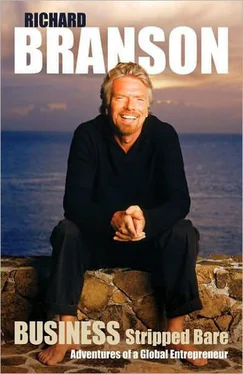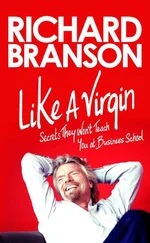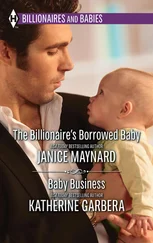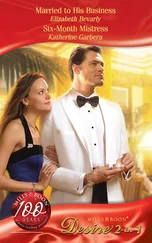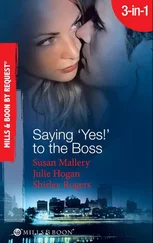After the emergency landing, I invited Tim and the whole crew to Necker, our private island in the British Virgin Islands, to say thank you. I’m pretty sure they had a good time, and I’m pretty sure that working for Virgin is more rewarding than flying for other carriers. In the end, though, we can only rely on Tim and pilots like him to look after themselves: to handle the tedium of routine long-haul flying and still be able to react brilliantly when things pack in around them.
For Virgin, it is fundamentally important to give people with the right temperament the freedom and responsibility to do their jobs properly — and Bonfire Night 1997 confirmed our decision only ever to hire the best pilots we could find.
Virgin Atlantic doesn’t take on pilots from scratch. We make sure that they have a long track record of experience in military or commercial flying — often up to ten years’ flying with a short-haul airline. Tim’s CV is longer than most: among the planes he’s flown are Spitfires and B17 bombers. We don’t require that all our flight crew are Britain’s number-one leading aerobatical display pilot in their spare time — but it helps! It’s also one reason why we are now able to recruit spaceship pilots from Virgin Atlantic and Virgin America and so easily find the test piloting and supersonic experience that we need for the unique Virgin Galactic mission.
When I started Virgin Atlantic Airways I appointed as our chief executive Roy Gardner, who had been chief engineer at British Caledonian, a highly respected airline. This emphasised our commitment to having someone at the helm who knew about the planes and was committed to safety. And at the time of writing this (I am never complacent because I understand the nature of mass transportation) Virgin Atlantic and all our other airlines have been in operation for twenty-five years without a major incident and without loss of life. I (like all involved in running an airline) hope I have another twenty-five years of being able to say the same thing.
Remembering who you are: it’s the biggest challenge an expanding business ever has to face . Virgin Atlantic is now a quarter of a century old and has worked hard to keep its original essence. I recall at the time, looking around on the very first day, wondering if we would ever be able to keep this up — all this enthusiasm, all this laughter. I wondered if we’d get the chance to be truly different.
Then I remembered Herb Kelleher.
Herb set up Southwest Airlines in Texas in the 1970s, and for nearly forty years his airline has set the benchmark for successful no-frills aviation in the United States. Southwest built its business around two innovations: low fares, and outstanding customer service. Considering the woeful record of many of America’s other airlines, this has always impressed me. Looking back, I think Kelleher’s thinking made a big difference to how we approached things at our airlines, and particularly in Australia with Virgin Blue.
From day one, Herb and his executive colleague Colleen Barrett focused on developing the company’s culture — a way of doing things that would sustain its founding values as the years went by.
We’ve already met Herb’s dictum about hiring for attitude and training for skill. His other ‘primary attitudes’ are also Virgin’s and my attitudes, through and through:
1. Employees are number one. The way you treat your employees is the way they will treat your customers.
2. Think small to grow big.
3. Manage in the good times for the bad times.
4. Irreverence is OK.
5. It’s OK to be yourself.
6. Have fun at work.
7. Take the competition seriously, but not yourself.
8. Think of the company as a service organisation that happens to be in the airline business.
9. Do whatever it takes.
10. Always practise the Golden Rule, internally and externally.
The egalitarian spirit of Southwest Airlines has driven its success. Even in the first quarter of 2008, with a weak economy and soaring jet-fuel prices, it achieved record operating revenues — a staggering $2.53 billion — and its net income actually went up — by 30 per cent! — to $43 million. You don’t achieve results like that without the loyalty of a huge number of happy and satisfied customers.
Herb and Colleen and the managers of Southwest understood, better than most in this industry, that employee satisfaction and customer service are two sides of the same coin. They have maintained their culture of customer service by employing people who are right for the business, and by giving them the tools and incentives to do their work well. Until recently, they had no serious rivals. Now, I’m proud to say, they’ve got Virgin America to contend with: a younger, fresher organisation. This is going to be a memorable tussle, but a tussle rather than a fight because the real enemies are the huge, heavily protected legacy carriers in the United States who have fed off barely disguised subsidies from Congress for nearly a decade whilst letting their planes age, service standards collapse, prices rise and people become demoralised.
* * *
Every once in a while, the vast Virgin Group has to remind itself who it is. This is never a one-man job. Stephen Murphy’s arrival as chief executive was part of a major overhaul of Virgin’s operations. Along with colleagues such as Gordon McCallum, Robert Samuelson, David Baxby, Frances Farrow, Patrick McCall, Mark Poole and Will Whitehorn, Stephen and the team have helped reshape and redefine where we wanted to be as a business.
Now, that paragraph probably struck fear into your heart. Restructuring is a pretty bloody process, right?
It can be. If your business has ossified to the point where you haven’t a clue what’s wrong, and in desperation you’ve called in a bunch of management consultants who charge by the hour, then, let’s face it, your troubles began some while ago.
I’m not saying for a second that the Virgin Group finds structural changes painless. But we do have this advantage over most businesses: we’re modular. We can shed limbs and split functions without turning the whole operation upside down. Over the years we’ve been criticised for turning ourselves into a ragbag of unconnected businesses. Our critics miss two important points. First, they’re not assigning enough importance to the Virgin brand. (I’ll try to explain our brand philosophy, and how it has helped us thrive in diverse businesses, in the next chapter.) The second point is: so what? Ending up as a ragbag of assorted companies now and again is no disadvantage to a group that does its housework regularly and keeps its businesses as small, independent and entrepreneurial as possible.
Circumstances and opportunities change. The world changes, come to that. The only constant is change itself . When I started in business, the standard one-liner about commercial short-sightedness was ‘People will always need hats’. Oh, how we tittered, as we stuffed those LPs in big brown envelopes and lugged them to the post office. These days the line to raise a youthful sneer is probably ‘People will always need rock albums’.
Companies aren’t change-proof, and no company will last for ever. And in the Virgin Group particularly, they come and go. What’s wrong with that? Companies do things. They are tools designed for a particular purpose — or they should be. If they are superseded, or surplus to requirement, we shed them. We try our level best not to shed the people, or the know-how, but the company itself is not something we allow ourselves to get too nostalgic about. When Virgin renews itself, critics who tut-tut at all the leaves falling to the ground have failed to spot the tree.
Читать дальше
